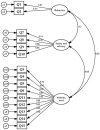Validation and Cultural Adaptation of the Parent Attitudes about Childhood Vaccines (PACV) Questionnaire in Arabic Language Widely Spoken in a Region with a High Prevalence of COVID-19 Vaccine Hesitancy
- PMID: 36136645
- PMCID: PMC9504773
- DOI: 10.3390/tropicalmed7090234
Validation and Cultural Adaptation of the Parent Attitudes about Childhood Vaccines (PACV) Questionnaire in Arabic Language Widely Spoken in a Region with a High Prevalence of COVID-19 Vaccine Hesitancy
Abstract
The parents’ attitude toward vaccinating children and adolescents against coronavirus disease 2019 (COVID-19) remains inconsistent and needs further elucidation. The high rates of COVID-19 vaccine hesitancy in the Middle East and North Africa (MENA) region require intensive research to understand the determinants of this phenomenon. This study aimed to validate a version of the Parent Attitudes about Childhood Vaccines (PACV) tool in Arabic, the most widely spoken language in the MENA. The study objectives included the investigation of Arab-speaking parents’ views regarding COVID-19 vaccination of their children. Parents living in Egypt with at least one child aged 5−18 years were eligible to participate in the study that was conducted through an online survey with 15 PACV items. The PACV tool was translated into Arabic using forward and backward translation. To assess the psychometric properties of the Arabic version of PACV, Pearson’s correlation coefficient and exploratory and confirmatory factor analysis (EFA and CFA) were performed. A total of 223 parents participated in the study: 59.82% aged 30−39 years, 69.20% were females, 46.19% were university-educated, and 40.63% had one child. The overall Cronbach’s alpha for the Arabic version of PACV was 0.799. The EFA of the 15 items showed that three domains were most conceptually equivalent. All items had a positive significant correlation with the mean score of each subscale except for item 4 (r = 0.016, p = 0.811). Regression analyses results indicated that education, previous COVID-19 infection, vaccine status of parents, and PACV score were significantly associated with the intention of the parents to vaccinate their children against COVID-19. The CFA results showed that most of the factor loadings were statistically significant (p < 0.010) except for items 4 and 7. However, the root mean square error of approximation (RMSEA = 0.080) and the standardized root mean squared residual (SRMR = 0.080) indicated that the model had a reasonable fit, and the three factors were good in reproducing each correlation. Our study results indicated the validity and reliability of the PACV instrument in Arabic language. Consequently, the PACV can be used to assess COVID-19 vaccine hesitancy in a majority of MENA countries for better delineation of this highly prevalent phenomenon in the region.
Keywords: SARS-CoV-2; immunization; parents’ beliefs; vaccine acceptance.
Conflict of interest statement
The authors declare no conflict of interest.
Figures


Similar articles
-
Vaccine hesitancy and its determinants among Arab parents: a cross-sectional survey in the United Arab Emirates.Hum Vaccin Immunother. 2020 Dec 1;16(12):3163-3169. doi: 10.1080/21645515.2020.1753439. Epub 2020 May 13. Hum Vaccin Immunother. 2020. PMID: 32401612 Free PMC article.
-
Adaptation and application of the Parent Attitudes About Childhood Vaccines survey tool in the Vietnamese language: a cross-sectional study.BMC Public Health. 2024 Apr 2;24(1):946. doi: 10.1186/s12889-024-18389-x. BMC Public Health. 2024. PMID: 38566076 Free PMC article.
-
Application of the Parent Attitudes about Childhood Vaccines (PACV) survey in three national languages in Switzerland: Exploratory factor analysis and Mokken scale analysis.Hum Vaccin Immunother. 2021 Aug 3;17(8):2652-2660. doi: 10.1080/21645515.2021.1894894. Epub 2021 Mar 24. Hum Vaccin Immunother. 2021. PMID: 33760690 Free PMC article.
-
Validation study of the Parent Attitudes About Childhood Vaccines (PACV) questionnaire: the Malay version.Hum Vaccin Immunother. 2020 May 3;16(5):1040-1049. doi: 10.1080/21645515.2019.1674112. Epub 2019 Oct 29. Hum Vaccin Immunother. 2020. PMID: 31567057 Free PMC article.
-
Evaluating COVID-19 vaccine acceptance among parents in Saudi Arabia: a systematic review examining attitudes, hesitancy, and intentions.Front Public Health. 2024 Mar 22;12:1327944. doi: 10.3389/fpubh.2024.1327944. eCollection 2024. Front Public Health. 2024. PMID: 38584927 Free PMC article.
Cited by
-
Vaccine Hesitancy of COVID-19 among Parents for Their Children in Middle Eastern Countries-A Systematic Review.Vaccines (Basel). 2023 Oct 1;11(10):1556. doi: 10.3390/vaccines11101556. Vaccines (Basel). 2023. PMID: 37896959 Free PMC article. Review.
-
Determinants of parental seasonal influenza vaccine hesitancy in the Eastern Mediterranean region: A cross-sectional study.Front Public Health. 2023 Mar 28;11:1132798. doi: 10.3389/fpubh.2023.1132798. eCollection 2023. Front Public Health. 2023. PMID: 37056660 Free PMC article.
-
Pervasive Parental Hesitancy and Resistance towards Measles Rubella Vaccination in Jordan.Vaccines (Basel). 2023 Oct 31;11(11):1672. doi: 10.3390/vaccines11111672. Vaccines (Basel). 2023. PMID: 38006004 Free PMC article.
-
Acceptance of COVID-19 Vaccine Booster Doses Using the Health Belief Model: A Cross-Sectional Study in Low-Middle- and High-Income Countries of the East Mediterranean Region.Int J Environ Res Public Health. 2022 Sep 25;19(19):12136. doi: 10.3390/ijerph191912136. Int J Environ Res Public Health. 2022. PMID: 36231447 Free PMC article.
-
Attitude of Parents of Children with Cerebral Palsy Towards COVID-19 Vaccination.Int J Environ Res Public Health. 2023 Jan 20;20(3):1909. doi: 10.3390/ijerph20031909. Int J Environ Res Public Health. 2023. PMID: 36767281 Free PMC article.
References
-
- World Health Organization (WHO) WHO Coronavirus (COVID-19) Dashboard. [(accessed on 20 August 2022)]. Available online: https://covid19.who.int/
-
- United Nations International Children’s Emergency Fund (UNICEF) COVID-19 Confirmed Cases and Deaths: Age- and Sex-Disaggregated Data. [(accessed on 20 August 2022)]. Available online: https://data.unicef.org/resources/covid-19-confirmed-cases-and-deaths-da...
LinkOut - more resources
Full Text Sources
Research Materials
Miscellaneous

